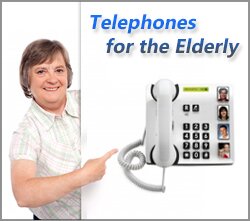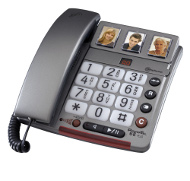
Choosing phones for older people that are easy to use and set up is a lot easier and more affordable than ever. Telephones for the elderly & hard of hearing and for the disabled come with a wide choice of features and accessories that cater for just about any requirement, making day to day communication much easier for all.
Some very useful features in telephones designed for the elderly, hard of hearing and disabled include:
- Amplified ringers to announce incoming call. Amplifiers come built-in on many models of phones, and are also available as an accessory that can be added to most other types of phone for the hard of hearing
- Big Button Telephone keypad – ideal for anyone with restricted dexterity of visually impaired
- Telephone hand sets that are hearing aid compatible to improve quality of ca ll and avoid interference
- Visual ring setting so that incoming calls are also noticeable visually and audibly. This feature is particularly popular for those with severe hard of hearing
- Large back-lit LCD display lights up for incoming and outgoing calls to help with caller identification and number dial recognition
- Caller ID setting to announce incoming caller details
- Programmable phone book
- Hands free operation
- Picture memory buttons are popular for the caller to identify the person they wish to contact by visual recognition. Press the button and it automatically dials that person. Particularly helpful for those with dementia, memory loss or forgetfulness
- Vibration alert socket allows a vibration pad to be connected to the telephone. The vibration pad is helpful for anyone with severe deafness
- Telephones for the elderly can also be supplied with a panic button / alarm pendant to alert pre-programmed contacts to be alerted should a fall, ill health or urgent attention be required
- Touch screen operated telephones

As you can see, the range of features and plug-in accessories for phones for the elderly accessories are extensive. Phones also have many features that are helpful to any of the following conditions:
- Hard of hearing
- Visual impairment
- Limited dexterity
- Restricted mobility
- Dementia
As well as phones for the elderly, there are also a range of mobile phones for the elderly which include many helpful features such as:
- GPS tracking
- Panic Buttons / SOS
- Big buttons
- Extra loud ring tone
- Call Amplification
If you are choosing a phone and would like help please talk to one of our independent living experts and we’ll be happy to speed the process up for you and recommend the telephone that best meets your requirements. Call on lo-call 1890 480 480 or send an enquiry here.
Image Source: FreeDigitalPhotos.net
Source: http://www.homecaretechnologies.ie/blog/42-telephones-for-the-elderly



